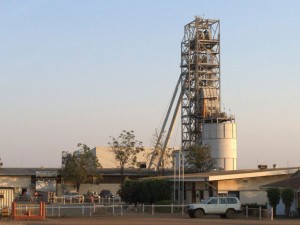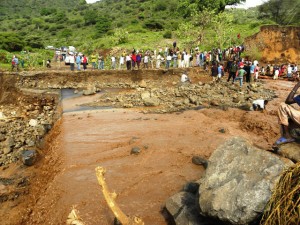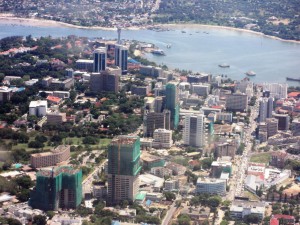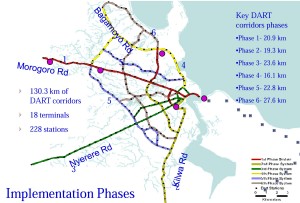Compiled by Valerie Leach
Economic management in Tanzania continues to be challenging. Large food surpluses in the West are stockpiled as transportation bottlenecks prevail, consumer prices rise, especially for food and fuel, and districts in the North of the country and neighbouring countries to the North face acute food shortages.

Bags of maize stuck at the railway station in Mpanda District, Rukwa Region, due to lack of transport. Photo: Musa Mwangoka - The Citizen
While a ban against private food crop exports officially remains in place, Tanzania has opened its doors to drought-affected countries to negotiate directly with it in the drive to procure food. “Neighbouring countries confronted with a food crisis are welcome to deal directly with the government instead of farmers, traders or agents in border regions for food purchases,” Prof Jumanne Maghembe, the Minister for Agriculture, Food Security and Cooperatives said. He said Tanzania has a surplus of 1.7 million tonnes of food. Tanzania’s move comes against a backdrop of rampant food smuggling to neighbouring countries. The Tanzanian police estimates that more than 400MT of maize is trucked daily out of the country through Mara, Arusha and Kilimanjaro to Kenya, South Sudan, Somalia and Ethiopia – East African News Agency.
Food prices in Tanzania have risen sharply. The National Bureau of Statistics (NBS) reported that the headline inflation rose to 13% in July from 10.9% in June. Prices of food and non-alcoholic beverages rose by 15.9% for the year ending July 2011. Food and non-alcoholic beverages account for 47.8% of Tanzanians’ ‘shopping basket’ – The Citizen.
Fuel prices have also risen sharply. The NBS reported that energy prices rose by 34.2% in the year to July 2011, compared with a rise of 29.0% in the year to June 2011. The increasing prices of food and energy contrast with stable prices of other items in the consumer price index.
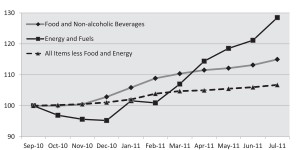
Price movements of different components of the Consumer Price Index - Source: National Bureau of Statistics, www.nbs.go.tz
The Energy and Water Utilities Regulatory Authority (EWURA) announces new fuel prices fortnightly. Early in August EWURA published indicative prices which sparked a boycott by major oil importing firms. Following the boycott, EWURA slapped a three-month no-sale ban on BP Tanzania, a firm in which the government has a 50% stake, and strongly warned a couple of others. Two top executives of BP (Tanzania) Limited were arrested in Dar es Salaam. They were granted bail and are due to appear in court to answer charges related to economic sabotage. EWURA is also monitoring conduct of oil dealers Total and Oryx following reports that some of their filling stations resisted selling fuel at the new prices. New prices announced mid-August effectively restore the pre-boycott oil price levels. Minister Ngeleja justified the increase, saying it was prompted by two major factors: an increase in oil prices on the world market and a fall in the value of the local currency relative to the American dollar – The Guardian.
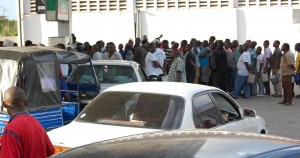
Huge queues at Sinza petrol station in August - Photo Jackson Odoyo
Tanzania’s economy to grow by 7.3% in 2012
Tanzania’s economy is expected to grow by 6.9% this year and 7.3% in 2012, according to a new report of the African Development Bank, African Economic Outlook. The report also says that the country’s economic growth faces great risks, including increasing fiscal deficit, and inflationary pressure from fuel and food prices. “The infrastructure deficit such as lack of reliable energy may pose a threat to the struggling economic growth not only in Tanzania but also in other countries,” said Prof Mthuli Ncube, the African Development Bank (AfDB) chief economist. Last May, the International Monetary Fund (IMF) cut its 2011 growth forecast for Tanzania to 6% from 7.2% in March, saying frequent power outages would hurt output while food and fuel prices could push inflation to higher levels – Daily News.
Imports and Exports
During the year ending May 2011, the current account deficit widened by 3.6 per cent to USD 2,607.4 million compared with the year ending May 2010. This was the result of a larger increase in imports than the increase in export earnings. The increased cost of imports was mainly on account of persistent increases in global oil prices. Moreover, there was a significant rise in imports of fertilizer that could be associated with the implementation of Kilimo Kwanza. In the year ending May 2011, a total of 313,400 tons of fertilizer were imported compared with 235,000 tons imported in the similar period a year earlier. In the year ending May 2011, the value of exports of goods and services amounted to USD 6,447.1 million, an increase of USD 1,399.3 million when compared with amount realized in the year ending May 2010. This development was largely driven by good performance in gold, manufactured goods, coffee, tobacco, cashew nut as well as receipts from travel and transportation services. Exported manufactured goods include cement, textile apparels, edible oil, wheat flour, plastic products, soap, paper products; and glass and glassware products. (Bank of Tanzania, Monthly Economic Review, June 2011).
Highlights of the Budget Session of the National Assembly, June-August 2011
This year’s budget session has been a lively one with MPs from all parties questioning budget proposals. In three ministerial budgets the Premier had to intervene. The first time, he withdrew the Energy and Minerals Budget and asked Parliament for three weeks to prepare emergency plans to deal with power rationing. MPs had rejected budget proposals for the Ministry of Energy and Minerals, forcing the Prime Minister, who is head of government business in Parliament, to postpone it to August 13, when the government pumped in TSh1.2 trillion for short, medium and long term power generation aimed at easing the power crisis.
In addition, the MPs rejected budget proposals for the Ministry of Transport, prompting the cabinet to convene an emergency meeting that authorised an additional budget of TSh95 billion.
In the debate on the budget for the Ministry of Lands, Housing and Human Settlement Development, the Prime Minister moved quickly to allay MPs’ fears over land grabbing by assuring them that the government’s lease system guarantees that no one person can wholly own land in the country. “This is one thing that the government should be praised for,” the Prime Minister said. “No one can own land in this country and we have said that, come what may, we will not budge on this.” He added, however, that while there were areas where land is a critical issue, there was ample land in other areas that people were free to move into. “We should not fear to welcome investors in land if such investment will be beneficial for the country,” pleaded Mr Pinda – The Citizen.
Experts have warned that new tax waivers announced by the Treasury will further increase revenue losses incurred by the government through excessive exemptions and other generous fiscal incentives, which are currently put at nearly TSh2 trillion. The experts also argue that contrary to the government’s position, the fiscal incentives – which mostly comprise tax holidays, investment allowances and tax credits, timing differences, and general tax reductions – will not necessarily attract investments. Research undertaken by local and international institutions has established that the concessions play only a marginal role in influencing investors’ decisions. “Experience shows that a high occurrence of tax exemptions reduces the tax base, creates room for bribery and corruption, and increases the appearance of loopholes for tax evasion.” researchers at the Christian Michelsen Institute of Norway noted in their June 15, 2011 report on tax opportunities and challenges in Tanzania, Zambia and Mozambique – The Citizen.
Energy
Members of Parliament cautiously welcomed the government’s emergency power generation plan and called for prudent use of the billions of shillings that will be invested. But some opposition MPs accused the government of ignoring proposals to cut its unnecessary expenditure to fund the emergency plan instead of borrowing from the commercial banks – The Citizen.
The government’s emergency power production plan indicates that 572 megawatts (MW) will be produced between August and December, with the National Social and Security Fund (NSSF) coming in as a new player who will produce 150 MW. Other players who will contribute to the power pool are Symbion which will inject 112 MW, IPTL who will produce 100 MW and Aggreko who will supply 100 MW. The emergency plan will cost TShs 523bn. Tanesco will manage TShs 115bn from sales of power and the government will obtain a TShs 408bn loan from a bank – Daily News.
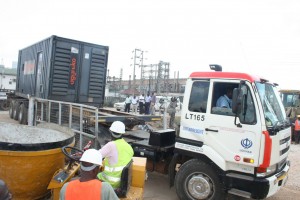
Aggreko generating equipment is offloaded in Ubungo, Dar-es-Salaam - photo Victor Makinda
Land
The government will establish the land bank to facilitate protection of land and make it easily available for investment purposes in a move which seeks to avoid conflicts among investors and villagers. It will also enable people in the area to benefit from land resource at the same time enhance sustainability of extensive land-based investments, Minister Tibaijuka told the National Assembly. She said under the new arrangement, villagers would have shares in the invested land but under invested value method of land valuation. Shares and profit will be shared among the investors, relevant district council and the central government. She said a bill for the establishment of the bank would be tabled in the House after completion of necessary preparations. The Minister also said that the government would establish Land Compensation Fund to be used for compensating parties moved from their land for national development projects – Daily News.
Agriculture
The government will implement two ambitious agricultural programmes during the 2011/12 financial year, namely the Southern Agricultural Growth Corridor of Tanzania (SAGCOT) and the Marketing Infrastructure, Value Addition and Rural Finance Support Programme (MIVARF), to boost agricultural production. Presenting his office’s TShs 3.4trl budget estimates, the Prime Minister, Mr Mizengo Pinda, said that the government has set aside TShs 1.5bn while donors have pledged TShs 26.3bn for the 20-year SAGGOT programme. He said the government in collaboration with International Agriculture Development Fund, African Development Bank and Alliance for a Green Revolution in Africa would start implementing MIVARF next month. MIVARF to be implemented in 7 years, will cover all regions in the country plus Zanzibar – Daily News.
Crop Marketing
The Ministry of Agriculture, Food Security and Cooperatives is preparing a new procedure dubbed ‘commodity exchange markets,’ in order to improve the crop marketing system for major cash crops. Tabling his 2011/2012 budget estimates, Agricultural Minister Prof Jumanne Maghembe said his ministry, in collaboration with other sectoral ministries and stakeholders, were preparing the system which would be a special marketing system for farmers. “This system will start being implemented for crops which are already in the process of being sold through the warehouse receipt system,” he said. The Minister said further that the budget allocated for the Grain and Mixed Crops Board for implementation of the commodity exchange markets was TShs 8.19bn – Daily News.

